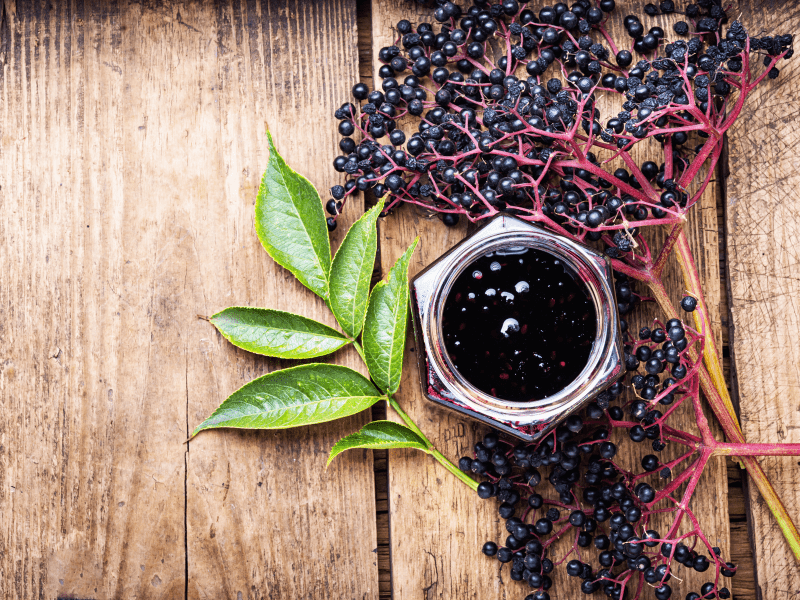
Health Benefits & Side effects of Elderberry
Elderberry
Similarly to turmeric, the elderberry plant was used in traditional medicine for many diseases long before interest in it picked up in Western medicine. It is a source of protein, unsaturated fat, fiber, vitamins, antioxidants and minerals. Many of the components of this plant are highly active within the human body; research is only now beginning to understand exactly how these all influence our health. The main effects seem to be due to the high concentration of polyphenols, which are a group of compounds found in many berries and spices and are well-known to be antioxidants.

Macronutrient Composition
Elderberry fruits are composed of around 2.7% protein. Unusually for a berry, this is a complete protein source which means that it contains all of the amino acids that cannot be synthesized in the body [1]. Since we cannot create these amino acids, we must consume them in our diet. These berries provide a small but valuable contribution to the total dietary intake of complete protein, which is particularly useful for those on a plant-based diet who do not consume animal proteins.
The fats in elderberries are mainly in the seeds, as they are made up of around 22.4% oil. This fat is almost entirely unsaturated: mainly linolenic, linoleic and oleic acids [1]. This makes them an excellent source of omega-3 fatty acids, which has had a significant boost of scientific attention over the last few decades.

Fruit extracts of 10 verities of Elderberry. Mladěnka, P., et al., (2016).
Antioxidant Effects
Effects on Diabetes & Obesity
Antiviral & Antibacterial Effects
One of the most popular uses of the elderberry plant in traditional medicine is as a treatment for respiratory infections. Scientific research is helping healthcare providers to understand that elderberry flowers are both antiviral and antibacterial, making them a natural therapy for influenza and colds. The polyphenol compounds in the flower extract bind directly to the influenza - a virus, preventing it from penetrating cells in the body and inhibiting infection upon exposure [1].
Elderberry juice concentrate may also protect those who become infected from weight loss while they have influenza, while also stimulating the body’s own immune response. Commercially available elderberry extracts inhibit both influenza A and B, as well as streptococcus infections [1]. A large meta-analysis also concluded that elderberry supplementation during upper-respiratory infections significantly reduced the overall duration of symptoms, showing that this could be a safe, effective home-remedy for colds and flus when used correctly [3].
Anti-inflammatory Effects
Chronic inflammation is one of the consequences of obesity and some diseases, and may be a cause of later complications. In animal studies, supplementing the diet with black elderberry reduced the blood concentration of inflammatory markers by over 30%. This is likely due to the presence of anthocyanins, a protective compound abundant in black elderberries [4].
Anticarcinogenic Effects
Diets high in plant foods are associated with a lower risk of various cancers, due to their abundance of micronutrients. Flavonoids and anthocyanins, two types of polyphenol found in elderberry and other berries, influence markers of DNA damage in cells studies and inhibit the development of malignant tumours [3]. There is not currently strong evidence linking elderberry directly to a reduction of cancer risk, however the indirect evidence is promising. Studies on cell cultures have suggested that berry components prevent carcinogens from binding to DNA [5].
Risks & Limitations of Elderberry
Elderberry is not toxic, but consuming large amounts of the immature plant can cause nausea and vomiting. However, commercial processing of the plant almost always involves heating it, degrading the compounds responsible for this [1]. This means that elderberry products from a store don’t cause these unwanted symptoms.
There are, however, no clinical trials on the interaction of elderberry components with medicines. Those on antidiabetic drugs, morphine, diuretics and immunoactivity drugs should seek medical advice before supplementing their diet with large amounts of elderberry. Due to the lack of information on its toxicity, pregnant women and children should also be very careful when adding this to their diet [1].
It is important to remember that the chemical composition of elderberry can vary, depending on things such as the variety, ripeness and climate [1]. This means that consuming elderberry from different sources will have very slightly different benefits, which may not be the same as what the research suggests. However, there is no doubt that elderberry is a rich source of vitamins and nutrients. Add it to a healthy, varied diet and combine it with other nutrient-rich foods for optimal health protection.
References
[1] Sidor, A. and Gramza-Michałowska, A., 2015. Advanced research on the antioxidant and health benefit of elderberry (Sambucus nigra) in food–a review. Journal of functional foods, 18, pp.941-958.
[2] Wu, X., Cao, G. and Prior, R.L., 2002. Absorption and metabolism of anthocyanins in elderly women after consumption of elderberry or blueberry. The Journal of nutrition, 132(7), pp.1865-1871.
[3] Hawkins, J., Baker, C., Cherry, L. and Dunne, E., 2019. Black elderberry (Sambucus nigra) supplementation effectively treats upper respiratory symptoms: A meta-analysis of randomized, controlled clinical trials. Complementary therapies in medicine, 42, pp.361-365.
[4] Farrell, N.J., Norris, G.H., Ryan, J., Porter, C.M., Jiang, C. and Blesso, C.N., 2015. Black elderberry extract attenuates inflammation and metabolic dysfunction in diet-induced obese mice. British Journal of Nutrition, 114(8), pp.1123-1131.
[5] Duthie, S.J., 2007. Berry phytochemicals, genomic stability and cancer: evidence for chemoprotection at several stages in the carcinogenic process. Molecular nutrition & food research, 51(6), pp.665-674.
[6] Illustration showing parts of a black elderberry plant on a white background. https://depositphotos.com/vector-images/elderberries.html?qview=243926722
Mladěnka, P., Říha, M., Martin, J., Gorová, B., Matějíček, A. and Spilková, J., 2016. Fruit extracts of 10 varieties of elderberry (Sambucus nigra L.) interact differently with iron and copper. Phytochemistry Letters, 18, pp.232-238.